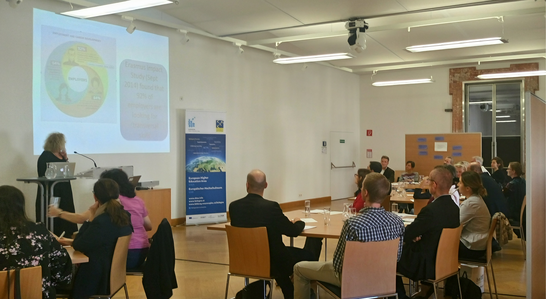Curriculum internationalisation - perspectives, strategies and pratical examples

“Internationalisation at home means the purposeful integration of international and intercultural dimensions into the formal and informal curriculum for all students within domestic learning environments.” (Jos Beelen and Elspeth Jones)
On 2 October 2017 the renowned internationalisation expert Elspeth Jones gave a lecture on five key questions concerning “internationalisation of the curriculum”:
- Why do we need internationalisation of the curriculum at home?
- What do we mean by it?
- How can we implement it?
- What are some of the things that obstruct or support our efforts?
- What does this mean for staff development?
“Internationalisation means interculturalisation – we need to work with other opinions and perspectives. We need to provide a curriculum that will reach 100% of all students when it comes to intercultural competences, no matter whether they are mobile or not.” Prof. Jones further underlined the pedagogical approach of Kolb’s Cycle of experimental learning, that mostly supports the acquisition of skills that are usually gained during a mobility of at least 2 or 3 weeks.
To cope with the “cultural otherness” and with “disorienting dilemmas” can be a part of the own curriculum as well, as Elspeth Jones stated. For example, employability skills and intercultural competences can be taught and learnt by internationalised learning outcomes. Prof. Jones further explained that the main target is to develop critical skills, and, having said that, to enable future graduates to operate effectively across cultures, and values. Finally, IoC-questionnaires support an internationalised curriculum or guidelines for curriculum review help to increase the awareness of cross-cultural capability & global Perspectives.
